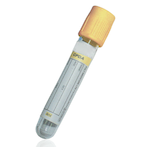Aspartate Aminotransferase (AST)
Specimen Volume
1mL whole blood (minimum sample volume 250uL)Turnaround Time
24 hoursSample Processing In Laboratory
No special requirementsSample Stability
7 days at 2-8°CGeneral Information
Aspartate aminotransferase (AST) is widely distributed, principally in liver, heart, skeletal muscle, kidney and red blood cells. Increased concentrations are found in diseases involving these tissues. Specifically hepatobiliary diseases including cirrhosis, metastatic cancer and viral hepatitis increase serum AST levels. Following myocardial infarction, AST is elevated and reaches a peak 2 days after onset. AST levels may be decreased in patients undergoing dialysis or with vitamin B6 deficiency.
Patient Preparation
No special patient preparation required.
Notes
Haemolysis interferes with measurement of AST activity.
Reference Range
Adult male/female reference range: 11-34 U/L (Abbott Alinity)
Source of Reference Range
In-house validationSpecifications
-
EQA Status:
NEQAS for Clinical Chemistry Scheme
- EQAS Scheme: Yes








